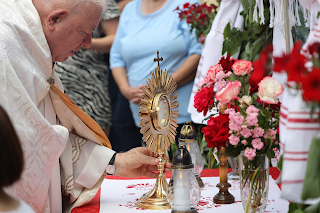ORIGIN OF THE SOLEMNITY OF CORPUS CHRISTI
The Feast of Corpus Christi stands as a profound celebration, resounding through the ages with the profound belief in the real presence of Jesus Christ in the Holy Eucharist. Originating in the depths of medieval history, this solemnity carries with it a story of faith, doubt, and ultimately, a miraculous affirmation.
The story dates far back as the year 1263, when Fr. Peter of Prague embarked on a pilgrimage to Rome, carrying within him the weight of doubt regarding the true presence of Christ in the Blessed Sacrament. Pausing in Bolsena, Italy, he found himself at the Church of St. Christina, where he celebrated the Holy Mass. It was here, amidst his internal turmoil, that the extraordinary occurred. As Fr. Peter recited the sacred words of consecration, a divine manifestation unfolded before him - blood began to seep from the consecrated host, a visceral testament to the reality of Christ's presence. This Eucharistic miracle, witnessed by Fr. Peter, would echo through the annals of history, reaffirming the faith of countless believers.
Moved by this profound occurrence, Fr. Peter journeyed to Pope Urban IV, recounting the miraculous event that had transpired. The pontiff, recognizing the gravity of the miracle, dispatched delegates to investigate the matter further. Upon their confirmation, Pope Urban ordered that the sacred relics - the host and blood-stained corporal - be brought to Orvieto, where they found their resting place within the Cathedral, serving as tangible evidence of the divine mystery.
Yet, story tale does not end here. It intertwines with the visions granted to St. Juliana of Mont Cornillon, a devout nun and mystic, who, in the twilight of the twelfth century, received divine instructions to establish a feast dedicated to the Holy Eucharist. Despite initial resistance, St. Juliana's steadfast devotion and fervent prayers eventually swayed the future Pope Urban IV to institute the Feast of Corpus Christi. Thus, in 1264, the inaugural celebration took place in Orvieto, a testament to the convergence of faith and miraculous intervention.
In the wake of this extraordinary event, Pope Urban commissioned the esteemed theologian and Dominican friar, St. Thomas Aquinas, to compose the Mass and Office for the newly established feast. Aquinas, inspired by the profound significance of the Eucharistic Miracle, penned timeless hymns of adoration, including the revered compositions of Pange Lingua, Tantum Ergo, Panis Angelicus, and O Salutaris Hostia. These hymns, resonating with the essence of faith and reverence, continue to echo through the hallowed halls of churches worldwide, serving as a melodic tribute to the enduring mystery of the Holy Eucharist.
Thus, the Feast of Corpus Christi emerges not only as a commemoration of a miraculous event but also as a testament to the enduring power of faith and devotion. It stands as a beacon of light, guiding believers through the labyrinth of doubt and uncertainty, towards the immutable truth encapsulated in the Real Presence of Jesus Christ in the Eucharist.




Post a Comment